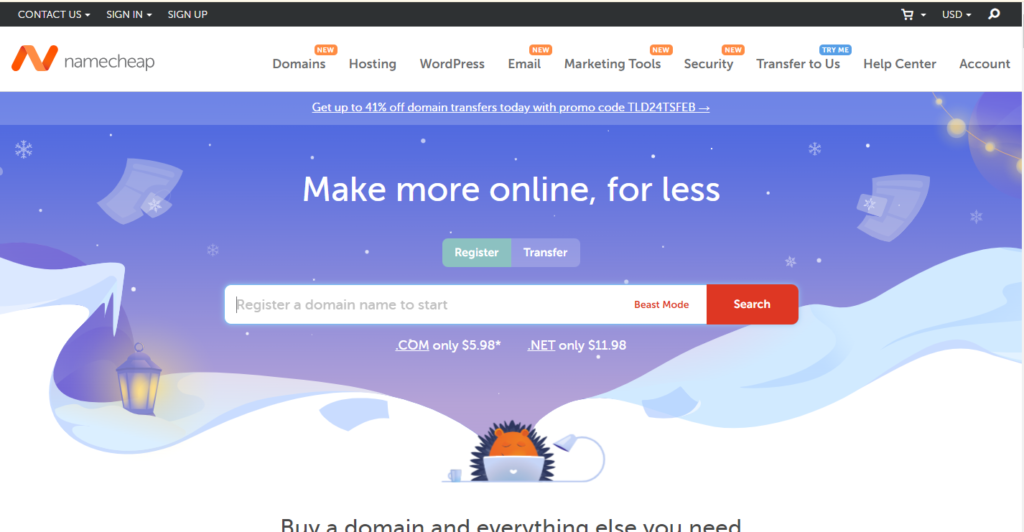Shared hosting is a cost-effective solution for individuals and businesses looking to establish their online presence without breaking the bank. It allows multiple websites to share resources on a single server, making it an ideal choice for those with modest needs and budgets.
Having a robust online presence is crucial for businesses in the digital era, making it vital to select the appropriate web hosting service.
In this guide, we’ll explore the top 5 best Shared web hosting providers in 2024, offering insights into their features, performance, pricing, and support to help you make an informed decision for your website.
Whether you’re launching a personal blog, a small business website, or an e-commerce store, choosing the right shared hosting provider can set the foundation for your online success.
What is Shared Hosting and How Does it Work?
Shared hosting is a budget-friendly option for website hosting, where multiple websites share resources on a single server. Similar to renting a room in a large apartment complex, each website occupies a portion of the server’s resources, including storage space, bandwidth, and processing power.
Managed by the hosting provider, shared hosting relieves users of server maintenance responsibilities, making it an attractive choice for beginners or those lacking technical expertise.
However, the shared nature of the environment means resources are distributed among multiple users, potentially leading to performance issues during traffic spikes or resource-intensive activities. Despite these limitations, shared hosting remains popular among individuals and small businesses seeking an affordable and hassle-free hosting solution.
Shared hosting offers a balance between cost-effectiveness and convenience, catering to the needs of users with modest requirements. While users may sacrifice some control over server configurations and may experience occasional performance limitations, the managed nature of shared hosting ensures a seamless hosting experience for those prioritizing simplicity and affordability.
Top Shared Hosting Companies for 2024
Now we will delve into the top 5 shared hosting providers renowned for their reliability, performance, and affordability in 2024. Each provider offers a range of features and pricing plans tailored to suit various needs, ensuring users can find the perfect hosting solution for their websites.
From industry giants to up-and-coming players, these hosting providers have earned their place as leaders in the shared hosting market, providing users with the tools and support necessary to establish and grow their online presence.
BlueHost - Best Shared Hosting Services
Bluehost distinguishes itself with a plethora of features designed to streamline the website hosting experience. Notably, its user-friendly interface and one-click WordPress installation simplify website setup for users of all skill levels. Additionally, Bluehost provides a range of tools and resources, including website builders, domain registration, and email hosting, empowering users to create and manage their online presence with ease.
Performance and Reliability Analysis
Bluehost excels in performance and reliability, boasting impressive uptime statistics and speedy loading times. Leveraging cutting-edge technologies and state-of-the-art server infrastructure, Bluehost ensures minimal downtime, with an uptime guarantee of 99.9%. This reliability is crucial for businesses seeking to maintain uninterrupted access to their websites, thereby minimizing potential revenue losses.
Server Uptime Performance
With a steadfast commitment to uptime, Bluehost delivers exceptional server uptime performance, ensuring websites remain accessible to visitors around the clock. This reliability instills confidence in users, knowing that their websites will remain operational, even during peak traffic periods or unexpected surges in demand.
Speed Loading Time and Bandwidth
Bluehost prioritizes speed and bandwidth, employing optimization techniques to deliver swift loading times and ample bandwidth allowances. This ensures smooth and uninterrupted website performance, even during periods of high traffic volume. With Bluehost, users can expect a seamless browsing experience for their visitors, enhancing user satisfaction and engagement.
Security Features & Compliance
Bluehost strongly emphasizes security, implementing robust measures to safeguard websites against cyber threats. From SSL certificates to SiteLock security, Bluehost provides comprehensive protection for websites, bolstering user confidence in the platform. These security features ensure the integrity and confidentiality of user data, mitigating the risk of data breaches and cyberattacks.
Pricing Plans
While Bluehost’s pricing may be slightly higher than some competitors, the value proposition offered by the platform justifies the investment for many users. Bluehost offers a range of plans to suit various budgetary constraints, starting from affordable shared hosting packages to more advanced options tailored for businesses with greater resource needs.
However, some users may find the lack of monthly billing options restrictive, especially those seeking more flexibility in payment schedules.
Pros and Cons
Bluehost stands out as a top choice for shared web hosting in 2024, combining an array of features, stellar performance, and reliable security measures to deliver an exceptional hosting experience for users. While its pricing may not be the most competitive in the market, the reliability and support offered by Bluehost make it a worthy investment for individuals and businesses looking to establish a strong online presence.

Hostinger - Reliable Shared Hosting Services
Key Features and Offerings
Hostinger is renowned for its extensive range of features and offerings tailored to meet the diverse needs of users. From its intuitive control panel to its robust security measures, Hostinger provides users with the tools and resources necessary to create and manage their websites effectively.
Notably, Hostinger offers a variety of hosting options, including shared hosting, VPS hosting, and cloud hosting, allowing users to choose the solution that best fits their requirements and budget.
Performance and Reliability Analysis
Hostinger excels in terms of performance and reliability, leveraging state-of-the-art technologies and infrastructure to deliver exceptional uptime and loading speeds. With its optimized servers and SSD storage, Hostinger ensures swift website performance and minimal downtime, even during periods of high traffic volume.
This reliability is crucial for businesses seeking to maintain uninterrupted access to their websites, thereby maximizing user satisfaction and engagement.
Server Uptime Performance
Hostinger boasts impressive server uptime performance, with a commitment to maintaining uptime levels above industry standards. Through proactive monitoring and maintenance, Hostinger minimizes the risk of downtime, ensuring websites remain accessible to visitors around the clock. This reliability instills confidence in users, knowing that their websites will remain operational, regardless of external factors or fluctuations in demand.
Speed Loading Time and Bandwidth
Hostinger prioritizes speed and bandwidth, employing optimization techniques to deliver fast loading times and ample bandwidth allowances. With its robust infrastructure and network optimization, Hostinger ensures smooth and seamless website performance, even during peak traffic periods. This enhances user experience and satisfaction, driving engagement and retention for websites hosted on the platform.
Security Features & Compliance
Hostinger strongly emphasizes security, implementing a range of measures to safeguard websites against cyber threats. From SSL certificates to DDoS protection, Hostinger provides comprehensive security features to protect user data and ensure the integrity of websites.
Additionally, Hostinger complies with industry standards and regulations, demonstrating its commitment to maintaining the highest levels of security and compliance for its users.
Pricing Plans
Hostinger offers affordable pricing plans to suit various budgetary constraints, making it an attractive option for individuals and businesses alike. With its competitive pricing and value-added features, Hostinger provides users with cost-effective hosting solutions without compromising on quality or performance.
Hostinger offers flexible billing options, including monthly, annual, and biennial plans, allowing users to choose the payment schedule that best fits their needs and preferences.
Pros and Cons
In summary, Hostinger stands out as a top choice for web hosting, offering a comprehensive suite of features, stellar performance, and reliable security measures. While its pricing plans may vary depending on the chosen hosting option and billing cycle, Hostinger provides excellent value for money, making it a preferred choice for users seeking affordable and high-quality hosting solutions.
However, some users may encounter limitations or restrictions based on their specific requirements or usage patterns, so it’s essential to carefully evaluate the pros and cons before making a decision.

Siteground - Top-Rated Shared Hosting Providers
Key Features and Offerings
SiteGround sets itself apart as the premier fastest shared hosting provider by offering a plethora of features tailored to meet the demands of users seeking top-notch performance and security.
From its advanced caching mechanisms to its free SSL certificates and daily backups, SiteGround provides users with the tools and resources necessary to build and maintain a secure and high-performing website.
SiteGround offers a range of hosting options, including shared hosting, cloud hosting, and dedicated servers, catering to the diverse needs of individuals and businesses alike.
Performance and Reliability Analysis
SiteGround is renowned for its exceptional performance and reliability, thanks to its robust infrastructure and cutting-edge technologies. With its custom-built server setup and optimized software stack, SiteGround ensures lightning-fast loading times and minimal downtime for websites hosted on its platform.
Moreover, SiteGround employs proactive server monitoring and maintenance to detect and address any potential issues before they impact website performance, thereby maximizing uptime and user satisfaction.
Server Uptime Performance
SiteGround boasts impressive server uptime performance, with a commitment to maintaining uptime levels above industry standards. Through its robust infrastructure and redundant network architecture, SiteGround minimizes the risk of downtime, ensuring websites remain accessible to visitors at all times.
This reliability instills confidence in users, knowing that their websites will remain operational, even during peak traffic periods or unforeseen circumstances.
Speed Loading Time and Bandwidth
SiteGround prioritizes speed and bandwidth, utilizing advanced caching mechanisms and content delivery networks (CDNs) to deliver fast loading times and ample bandwidth allowances.
With its optimized server setup and network infrastructure, SiteGround ensures smooth and seamless website performance, even during periods of high traffic volume. This enhances user experience and engagement, driving traffic and conversions for websites hosted on the platform.
Security Features & Compliance
SiteGround strongly emphasizes security, implementing robust measures to protect websites against cyber threats and vulnerabilities. From its AI-powered firewall to its proactive security patches and malware scans, SiteGround provides comprehensive security features to safeguard user data and website integrity.
SiteGround complies with industry standards and regulations, ensuring the highest levels of security and compliance for its users.
Pricing Plans
SiteGround offers competitive pricing plans to suit various budgetary constraints, making it an attractive option for individuals and businesses seeking premium-level hosting services. With its transparent pricing structure and value-added features, SiteGround provides users with cost-effective hosting solutions without compromising on quality or performance.
SiteGround offers flexible billing options, including monthly, annual, and biennial plans, allowing users to choose the payment schedule that best fits their needs and preferences.
Pros and Cons
In summary, SiteGround stands out as a top choice for secure and premium-level shared hosting, offering a comprehensive suite of features, stellar performance, and reliable security measures. While its pricing plans may be slightly higher than some competitors, the value proposition offered by SiteGround in terms of performance, security, and support justifies the investment for many users.
However, some users may encounter limitations or restrictions based on their specific requirements or usage patterns, so it’s essential to carefully evaluate the pros and cons before making a decision.

DreamHost - Reliable Shared Hosting Services
Key Features and Offerings
DreamHost distinguishes itself as a leading shared hosting provider by offering a wide array of features designed to meet the diverse needs of users. From its user-friendly control panel to its seamless one-click installation for popular CMS platforms like WordPress, DreamHost prioritizes simplicity and ease of use.
Moreover, DreamHost provides users with unlimited bandwidth and storage, ensuring ample resources to support their websites’ growth and scalability.
Performance and Reliability Analysis
DreamHost excels in terms of performance and reliability, leveraging its robust infrastructure and optimized servers to deliver exceptional uptime and loading speeds. With its SSD storage and advanced caching mechanisms, DreamHost ensures swift website performance, even during peak traffic periods.
DreamHost’s proactive server monitoring and maintenance help minimize the risk of downtime, ensuring websites remain accessible to visitors at all times.
Server Uptime Performance
DreamHost boasts impressive server uptime performance, with a commitment to maintaining uptime levels above industry standards. Through its redundant network architecture and data centers equipped with backup power supplies, DreamHost minimizes the risk of downtime, ensuring websites remain operational, even in the event of unforeseen circumstances or hardware failures. This reliability instills confidence in users, knowing that their websites are in safe hands with DreamHost.
Speed Loading Time and Bandwidth
DreamHost prioritizes speed and bandwidth, employing optimization techniques to deliver fast loading times and ample bandwidth allowances. With its optimized server setup and network infrastructure, DreamHost ensures smooth and seamless website performance, enhancing user experience and engagement.
Additionally, DreamHost’s unlimited bandwidth ensures that users can accommodate high levels of traffic without experiencing performance degradation or slowdowns.
Security Features & Compliance
DreamHost strongly emphasizes security, implementing robust measures to protect websites against cyber threats and vulnerabilities. From its free SSL certificates to its advanced security features like automated malware scans and DDoS protection, DreamHost provides comprehensive security solutions to safeguard user data and website integrity.
DreamHost complies with industry standards and regulations, ensuring the highest levels of security and compliance for its users.
Pricing Plans
DreamHost offers competitive pricing plans to suit various budgetary constraints, making it an attractive option for individuals and businesses alike.
With its transparent pricing structure and no hidden fees, DreamHost provides users with cost-effective hosting solutions without compromising on quality or performance.
Additionally, DreamHost offers a range of hosting plans, including shared hosting, VPS hosting, and dedicated servers, allowing users to choose the solution that best fits their needs and preferences.
Pros and Cons
In summary, DreamHost stands out as a top choice for shared hosting in 2024, offering a comprehensive suite of features, stellar performance, and reliable security measures. While its pricing plans may be slightly higher than some competitors, the value proposition offered by DreamHost in terms of performance, security, and support justifies the investment for many users.
However, some users may encounter limitations or restrictions based on their specific requirements or usage patterns, so it’s essential to carefully evaluate the pros and cons before making a decision.

NameCheap - Affordable Shared Hosting Providers
Key Features and Offerings
NameCheap emerges as a standout choice for those seeking affordable shared hosting solutions without compromising on quality. Despite its budget-friendly pricing, NameCheap offers an impressive array of features and offerings designed to meet the needs of individuals and small businesses.
From its user-friendly control panel to its free website builder and one-click WordPress installation, NameCheap provides users with the tools and resources necessary to create and manage their online presence effortlessly.
NameCheap’s shared hosting plans come with generous storage and bandwidth allowances, ensuring users have ample resources to support their websites’ growth and expansion.
Performance and Reliability Analysis
NameCheap prioritizes performance and reliability, leveraging state-of-the-art infrastructure and technologies to deliver optimal website performance and uptime. With its SSD-powered servers and optimized network architecture, NameCheap ensures fast loading times and minimal downtime for websites hosted on its platform.
Moreover, NameCheap employs proactive server monitoring and maintenance to detect and address any potential issues before they impact website performance, thereby maximizing uptime and user satisfaction.
Server Uptime Performance
NameCheap boasts impressive server uptime performance, with a commitment to maintaining uptime levels above industry standards. Through its redundant network infrastructure and reliable server hardware, NameCheap minimizes the risk of downtime, ensuring websites remain accessible to visitors at all times. This reliability instills confidence in users, knowing that their websites will remain operational, even during peak traffic periods or unexpected surges in demand.
Speed Loading Time and Bandwidth
NameCheap places a strong emphasis on speed and bandwidth, optimizing its servers and network infrastructure to deliver fast loading times and ample bandwidth allowances.
With its optimized caching mechanisms and content delivery networks (CDNs), NameCheap ensures smooth and seamless website performance, even during periods of high traffic volume. This enhances user experience and engagement, driving traffic and conversions for websites hosted on the platform.
Security Features & Compliance
NameCheap takes security seriously, implementing robust measures to protect websites against cyber threats and vulnerabilities. From its free SSL certificates to its advanced DDoS protection and malware scanning, NameCheap provides comprehensive security features to safeguard user data and website integrity.
NameCheap complies with industry standards and regulations, ensuring the highest levels of security and compliance for its users.
Pricing Plans
NameCheap offers affordable pricing plans for various budgetary constraints, making it an attractive option for individuals and small businesses seeking cheap shared hosting solutions. With its transparent pricing structure and value-added features, NameCheap provides users with cost-effective hosting solutions without compromising on quality or performance.
NameCheap offers flexible billing options, including monthly, annual, and biennial plans, allowing users to choose the payment schedule that best fits their needs and preferences.
Pros and Cons
In summary, NameCheap stands out as the best cheap shared hosting provider in 2024, offering a comprehensive suite of features, stellar performance, and reliable security measures at an affordable price point.
While its pricing may be lower than some competitors, the value proposition offered by NameCheap in terms of performance, security, and support makes it a preferred choice for individuals and small businesses looking to establish and grow their online presence without breaking the bank.
However, some users may encounter limitations or restrictions based on their specific requirements or usage patterns, so it’s essential to carefully evaluate the pros and cons before making a decision.

Top 5 Best Shared Hosting Providers Comparison
In this section, we will conduct a comparative analysis of the top five shared web hosting providers: Bluehost, Hostinger, SiteGround, DreamHost, and NameCheap. We will evaluate their pricing plans, performance metrics, customer support quality, and overall value for money to help you make an informed decision.
Pricing Plans:
Bluehost and SiteGround offer mid-range pricing plans, while Hostinger and NameCheap provide more budget-friendly options. DreamHost falls somewhere in between, offering competitive pricing with premium features. However, Hostinger stands out as the most affordable option, with plans starting at just a few dollars per month.
Performance Metrics:
In terms of performance, SiteGround and DreamHost lead the pack with exceptional uptime guarantees and fast loading times. Hostinger also performs well in this category, with efficient server infrastructure and reliable uptime. Bluehost and NameCheap offer respectable performance but may experience occasional fluctuations during peak traffic periods.
Customer Support Quality:
Bluehost and SiteGround excel in providing top-notch customer support, with 24/7 availability and knowledgeable representatives. Hostinger also offers reliable support, although it may not be as readily available as the top contenders. DreamHost and NameCheap provide adequate support options but may lack the responsiveness of their competitors.
Overall Value for Money:
When considering overall value for money, Hostinger emerges as the top choice due to its combination of affordable pricing and reliable performance. SiteGround and DreamHost also offer excellent value, albeit at slightly higher price points. Bluehost and NameCheap provide decent value for money but may not offer the same level of performance or support as their counterparts.
While each hosting provider has its strengths and weaknesses, Hostinger stands out as the best option for those prioritizing affordability without sacrificing performance or features. SiteGround and DreamHost also offer excellent value for money, making them suitable choices for users seeking premium-level hosting services. Ultimately, the right choice depends on your specific needs and preferences, so be sure to weigh the factors carefully before making a decision.
Factors to Consider When Choosing a Shared Hosting Provider
When selecting a shared hosting provider for your website, it’s essential to consider several key factors to ensure you make the right choice. Below are the crucial factors to consider when determining how to choose the right shared hosting.
Budget and Pricing Structure:
Begin by assessing your budget and evaluating the pricing structure of different hosting providers. Determine how much you’re willing to invest in hosting services and compare the pricing plans offered by various providers.
Keep in mind that while affordability is essential, it’s also crucial to consider the value provided by each plan in terms of features, performance, and support.
Required Resources and Scalability:
Consider your website’s requirements in terms of resources such as storage space, bandwidth, and processing power. Ensure that the hosting provider offers sufficient resources to accommodate your current needs and allows for scalability as your website grows.
Look for hosting plans that provide scalability options, such as the ability to easily upgrade to higher-tier plans or add additional resources as needed.
Reliability and Uptime Guarantees:
Reliability and uptime guarantees are critical factors to consider when choosing a shared hosting provider. When selecting a service provider, it is crucial to seek out those that offer high uptime guarantees, usually at 99.9% or above. This ensures that your website will be consistently accessible to visitors, maintaining a positive user experience and maximizing potential opportunities for engagement.
Additionally, research the provider’s track record for reliability and read user reviews to gauge their performance in this area.
Security Features:
Security is paramount when hosting a website, especially in a shared hosting environment. Evaluate the security features offered by each hosting provider, such as SSL certificates, firewalls, malware scanning, and regular backups. Ensure that the provider implements robust security measures to protect your website and data from cyber threats and vulnerabilities.
Ease of Use and Control Panel Options:
Consider the ease of use and user-friendliness of the hosting provider’s control panel. An intuitive control panel makes it easier to manage your website and hosting account efficiently. Look for hosting providers that offer user-friendly control panels, such as cPanel or Plesk, with comprehensive features and customization options.
Customer Support Quality and Availability:
Quality customer support is essential for resolving issues and maintaining uptime for your website. Evaluate the quality and availability of customer support offered by each hosting provider, including the channels of support available (such as live chat, phone, or ticketing system) and the responsiveness of their support team. Choose a hosting provider that offers 24/7 customer support with knowledgeable and helpful representatives.
Additional Perks and Bonuses:
Lastly, consider any additional perks and bonuses offered by the hosting provider, such as free domain registration, advertising credits, website builders, or e-commerce tools. These extras can add value to your hosting plan and enhance your overall hosting experience. Be sure to weigh these perks against the other factors mentioned to determine their significance in your decision-making process.
By carefully considering these factors, you can choose a shared hosting provider that aligns with your budget, requirements, and preferences, ensuring a reliable and hassle-free hosting experience for your website.
Is Shared Hosting Good?
Shared hosting can be an excellent option for many website owners, especially those who are just starting or have modest needs. It offers a cost-effective solution by allowing multiple websites to share resources on a single server. This shared environment helps keep costs low, making shared hosting one of the most affordable hosting options available.
One of the primary advantages of shared hosting is its simplicity and ease of use. With shared hosting, the hosting provider takes care of server maintenance, security, and other technical aspects, allowing website owners to focus on building and managing their websites without worrying about server management.
However, shared hosting may not be suitable for all websites, particularly those with high traffic or resource-intensive requirements. Since resources are shared among multiple websites on the same server, performance may be affected during peak traffic periods. Additionally, shared hosting may have limitations in terms of customization and flexibility compared to other hosting options like VPS or dedicated hosting.
Despite these limitations, shared hosting can still be a viable choice for many website owners, especially those with smaller websites or limited budgets.
By carefully evaluating your website’s needs and considering factors like performance, security, and scalability, you can determine whether shared hosting is the right option for you. Ultimately, shared hosting can provide a reliable and affordable hosting solution for websites with moderate traffic and resource requirements.
Advantages and Disadvantages of Shared Hosting?
Shared hosting offers several advantages and disadvantages that website owners should consider before choosing this type of hosting.
Advantages of Shared Hosting:
Shared hosting is often a more cost-effective option compared to other hosting solutions, making it a suitable choice for individuals and small businesses operating on a tight budget.
Additionally, shared hosting providers handle server maintenance, security, and technical support, allowing website owners to focus on building and managing their websites without worrying about server management.
These hosting plans often come with pre-installed software and easy-to-use control panels, making it quick and straightforward to set up and launch a website.
Many shared hosting providers also offer scalable hosting plans, allowing users to upgrade to higher-tier plans as their website grows and requires additional resources. Moreover, shared hosting providers typically offer 24/7 technical support to assist users with any issues or concerns they may encounter.
Disadvantages of Shared Hosting:
However, shared hosting does come with some limitations. Shared resources, such as the CPU, RAM, and bandwidth, are allocated among multiple websites on a single server. This can result in performance issues, particularly during periods of high traffic.
Users also have limited control over server settings and configurations, which may restrict customization options for advanced users.
Furthermore, shared hosting environments may pose security risks, as one website’s vulnerabilities could affect others on the same server. It’s essential to implement proper security measures to mitigate these risks. Shared hosting may experience performance limitations, especially for websites with high-traffic or resource-intensive applications.
Slow loading times and downtime can impact user experience and SEO rankings. If one website on the server experiences a sudden surge in traffic or consumes excessive resources, it can affect the performance of other websites on the same server, leading to downtime or slow loading times.
While shared hosting offers affordability, ease of use, scalability, and technical support, it also comes with limitations such as resource sharing, performance issues, and potential security risks. Website owners need to weigh the advantages and disadvantages carefully and choose a hosting solution that aligns with their specific needs and requirements.
What is Better Than Shared Hosting?
VPS (Virtual Private Server) hosting surpasses shared hosting in performance, scalability, control, and security. Unlike shared hosting, VPS offers dedicated resources, ensuring consistent performance even during peak traffic. Users have full control over their server environment, allowing customization to meet specific needs.
VPS also provides enhanced security measures, reducing the risk of breaches. While it may entail higher costs, the benefits of reliability, scalability, and security make VPS hosting a superior choice for websites with higher demands.
Conclusion
In conclusion, we’ve explored the nuances of the top 5 best Shared web hosting providers and highlighted the benefits and drawbacks of each. While shared hosting offers affordability and simplicity, it may face performance limitations and security concerns.
Conversely, VPS hosting provides dedicated resources, greater control, and enhanced security, making it suitable for websites with higher demands. Our recommendation for the top shared hosting provider in 2024 is SiteGround, known for its exceptional performance and reliable support.
Ultimately, the choice between shared hosting and VPS depends on individual needs, with careful consideration ensuring the best fit for optimal website performance and security.

